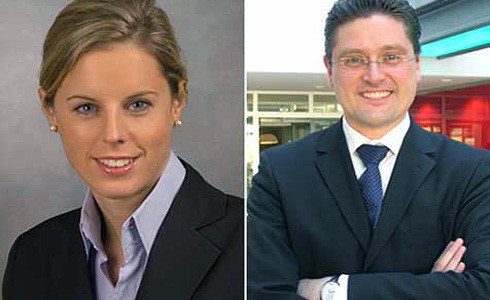Barbara Roder: Coming from the financial sector, we at My Finance Coach realized that there is a great need for financial education. In some developing countries, microinsurance programs already include the idea of financial literacy. But also In Western societies there is a lack of understanding basic financial concepts. At the same time, the increasing need for individual decision-making in financial affairs and limitied financial education at school further contribute to these problems: Today, many kids accumulate huge amounts of debts even before they are of age, especially costly cell phone contracts can be a problem.
Financial education for schoolkids
What is the prime directive of My Finance Coach?
We are focussing on 11-to-15-year olds because this is the age where kids ususally get in touch with their own money for the first time– they get pocket money or do their first summer jobs.

Barbara Roder, head of My Finance Coach, Ulrich Trauner, Volunteer:
"The childeren enjoy speaking with people who have real world knowledge and experience." (Foto: Allianz)
How do you at My Finance Coach choose partner organizations?
Barbara Roder: Potential partners must be willing to spare some sponsoring money to develop the programs and to share their expertise. It is important for us that the companies My Finance Coach teams up with do not have any sales objectives. We are intending to have a social impact, not to sell products.
Why do you think Allianz offered to be a part of your program? Why didn't they just donate some money?
Barbara Roder: The overall objective of Allianz's corporate social responsibility activities is that they offer their company's expertise and knowledge to the advantage of the entire society. Every company can donate money but providing the practical know-how has a much bigger impact. Taking part in a professional and valuable volunteering program is special and Allianz employees have the financial and economical skills. These core competencies are essential for our program.
How do you recruit volunteers? How do they react?
Barbara Roder: Applicants undergo a three-hour training. They get background information, pedagogical advise and learn do's and don'ts such as 'How do I address the kids?' 'What do I wear?' 'I don't make references to Allianz products or hand out business cards' and so on.
One school session lasts ninety minutes and the volunteers always go in pairs. It is a huge advantage of Allianz that the employees are working all over Germany. Usually, financial service providers reside in big cities, and their initiative can't reach smaller villages.
The reaction of the employees was overwhelming. We expected about 300 people to apply and now we already have 640. Of course, it takes some time to convince them. They are always nervous before the first visit. But the reactions and feedback we receive from both sides is so positive that it is worth the try.
Ulrich Trauner: Volunteering is a great experience. Of course, it costs some of your time but it's very well invested.
Can you tell us a bit more about your background and how you helped My Finance Coach?
Ulrich Trauner: At Allianz Global Investors, which is the asset management division of the Allianz Group, I am responsible for corporate development in Europe. I truly believe that financial education is not getting enough attention in schools. With our experience of financial markets related matters, we should be able to teach the kids about serious money issues - but this hopefully in a fun way. With the strong support of My Finance Coach and the great curriculum the need of factual information and a delivery in an innovative and fun way is ensured.
Of course it's impossible to directly link my day-to-day business to teaching kids about saving money. But what we can do is reaching out to society and possible future customers – although we absolutely do not talk about Allianz and products. In our group we conduct a lot of trend surveys but physically talking to them is adding a lot to this. A classroom full of eleven-year-olds also means you need to change your language and attitude. Talking in acronyms and special terms won't do the trick here.
Barbara Roder: In fact, practical examples are far more valuable than dry theories. All students appreciate someone from the real business world, with real expertise and experience coming in and talking to them.
What exactly did you do with the kids?
Ulrich Trauner: We explain financial management and consumer behaviour with interactive games and group exercises, show videos and so forth. To explain that the price I pay for a product or service is not always an indicator for the quality I receive, we do the so-called 'chips test'. The students are offered a variety of potato chips to taste, ranging from expensive to cheap without knowing the brand and the price of the product. Interestingly, the cheap ones were often rated the tastiest. This can be transferred to other aspects of the kids' and general consumer behaviour. They learn the facts through a balanced mix of lecturing and games.
What's next for My Finance Coach?
Barbara Roder: We are currently looking for one or two additional partners to be able to enlarge our resources and capacity. We would like to implement My Finance Coach as a long-term sustainable initiative. We would also like to offer more out-of-classroom activities like a special teacher training, social media presence, competitions, or educational games. We are also developing two additional modules, "Risk" and "Ecology and Economy." In the near future, we would also like to offer our services internationally, right now, we are evaluating the offers of two countries who might soon join us.
As with all content published on this site, these statements are subject to our Forward Looking Statement disclaimer.
Link to the disclaimer